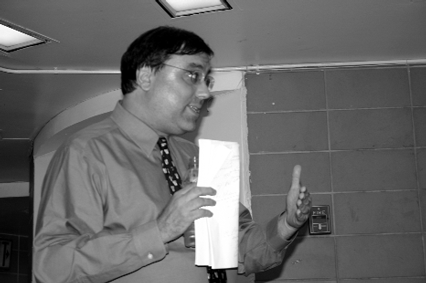By Albert Amateau
City Councilmember Alan Jay Gerson last week outlined an agreement he reached with the Department of Parks about changes to the Washington Square Park design that drew cheers and groans from an overflow crowd of parks partisans.
With Manhattan Parks Commissioner Bill Castro sitting behind him, Gerson said he hoped the agreement would be accepted as the basis for a future community consensus for a final redesign of the park.
Arthur Schwartz, new chairperson of the Community Board 2 Parks and Waterfront Committee, said he intended to put the issue up for a committee vote on Oct. 6 in time for the full board to consider at its monthly meeting.
Cheers greeted Gerson’s assurance that the three play mounds would be retained in their present location. The expansion of the children’s playground by 7,000 square feet and the creation of a new 8,000-square-foot playground for youngsters 9 to 12 years old were other pluses.
A permanent elevated concert area to be built where the elevated Teen Plaza is now located, with the hard surface retained, was another feature that pleased the crowd at the Sept. 15 meeting at the Tony Dapolito Recreation Center. An expanded chess area with more tables where the U.S. Federation would run events to promote the game received nods of appreciation.
A bigger cheer greeted Gerson’s announcement that the two dog runs for small pets and larger dogs would be expanded in rounder areas with entrances from the park rather than from the sidewalk periphery.
A promise that no gates would be installed blocking any of the future park entrances drew loud cheers and clapping. But groans and cries of “No!” erupted when Gerson said the department insisted on a fence surrounding the park. The fence, however, would be no higher than 3 feet 6 inches measured from inside the park and 4 feet including a concrete base when measured from outside the park.
The decision whether to move the fountain or keep it where it is now will await an engineering survey of the plumbing work needed, but the circular areas of the fountain plaza and the seating at the edge of the fountain will be there in the future, with more seats.
Undecided is whether the fountain plaza would be at ground level or depressed. A guitarist at the meeting protested that a flat plaza would “disable” traditional ad-hoc music-making around the fountain, but Gerson said he has heard musicians who disagreed with that opinion.
The Parks Department agrees there would be no curbs on acoustic music or public speech, no restaurant concessions would be allowed and no future donations of funds would be tied to naming. “And we’ll continue to try to convince the Tisch family to change their minds about the fountain,” Gerson said. The Tisch family has dedicated $2.5 million for the renovation of the central plaza and fountain, the latter which Parks plans to name for them when the job is done.
The Gerson agreement also calls for more than half the park to be fully accessible to the public during construction.
Several Villagers were pleased to hear the two regulation-size petanque courts would be replaced, probably near their present location. Margie Rubin, who uses a wheelchair, urged Gerson and the community board to consider handicapped accessibility as a must for features in the park
Gerson said he could still withdraw his $1.5 million discretionary fund contribution to the park reconstruction but he doesn’t want to do that. He said pulling the contribution would allow the Bloomberg administration to find other funding, or to decide to drop the park reconstruction altogether. Gerson noted that a potential park area in Chinatown, also in his Council district, has been undeveloped for years because community factions could not agree on what they wanted.
There were factions with opposing views of the hotly debated renovation project at the Sept. 15 committee meeting. Some said the new design was still geared to giving New York University a better space for its commencement.
The Washington Square Park Council announced that it has hired Project for Public Spaces, a nationally known organization, to conduct an Oct. 15 workshop. Matt Bardin, executive vice president of the council, said in the statement that the group was interested in improving the park, “not reinventing the park or changing its character or applying an artificial stamp on a great public space — actually multiple spaces — that has evolved organically over the years.”
However, the Washington Square Park Council came out against the deal Gerson struck, calling for “building a community consensus about the renovation of the park, not a redesign.”
The Open Washington Square Park Coaltion issued a survey and report before the meeting claiming that more than 95 percent of park users are opposed to the reconstruction. After Gerson’s presentation, Jonathan Greenberg, coalition co-chairperson, was still opposed.
Committee chairperson Schwartz said that the committee will vote on Oct. 6 but not on the open question of whether the board should revisit the board’s existing resolution in support of the renovation project. Rather, the committee will vote on two points, he said: on whether to approve Gerson’s proposal — but, he added, there will be several “buts,” such as that the committee doesn’t approve of the fence, or that the fence should be lower; and that the fountain shouldn’t be moved or restructured.




































